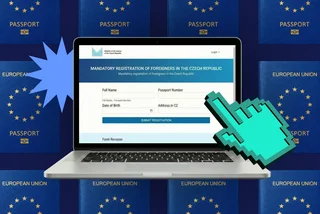Taxes – never really a fun thing for anyone, but doubly so for American expats who are required to file an annual return with the Czech state as well as Uncle Sam. Those who have repeatedly failed to comply may soon find it harder to keep dodging the U.S. Internal Revenue Service (IRS). The Foreign Account Tax Compliance Act (FATCA) is forcing foreign financial institutions around the world to disclose information regarding their American clients to the IRS. This federal dragnet affects everyone from the very wealthy to the low-paid TEFL teacher.
While it was signed into law in 2010, its full impact wasn’t felt until this July, when foreign banks officially started funneling account information held by U.S. citizens to American authorities.
We talked to John Mohr, a Prague-based U.S. enrolled agent who runs his own firm, cfo2go, for the lowdown.
Break down what FATCA means to the typical American expat.
Sometime between now and the end of the year, I expect banks will send out letters to all their account holders they know are American citizens, and they are going to ask them for permission to share information about their accounts with the IRS. For those who tell the bank, “yes,” the banks will begin issuing the reports to them and the IRS – much like the U.S.-based 1099 system Americans know today.
For those who tell the bank “no”, the IRS is probably going to follow up with them directly.
Why are foreign financial institutions agreeing to disclose information about their American clients?
FATCA legislation basically says to foreign financial institutions, that if they don’t participate in the program then any transfers to them from a U.S. bank or from any other foreign bank that is participating in the program will be subjected to a non-creditable, 30-percent withholding tax.
So what FATCA does really is it basically says to foreign financial institutions that if you don’t play ball you cannot participate in the U.S. market at all. And that threat has apparently been strong enough that to date more than 77,000 financial institutions outside the U.S. have signed up to FATCA.
Does FATCA apply to dual nationals?
There’s no exception for someone who is an American citizen just because they have another nationality. They are still Americans and still subject to American rules.
What if you’ve never filed a U.S. return?
Expats who have not been filing for a long period of time most certainly, I think, need to start complying because the cost of not doing so will be incredibly high, even in the cases of those who don’t have a lot of money to report. There are certain circumstances where they could be penalized just because they didn’t file the information, especially if the IRS decides they didn’t file willfully. (Especially true if the expat needs to file a foreign bank account report (FBAR) – see below.)
The IRS expects a single person under age 65 to file if they have gross income from all sources greater than U.S. $10,000, and self-employed if they earn a penny more than $400. Even if you won’t pay any tax.
FBAR – Report of Foreign Bank and Financial Accounts – has been coming up a lot in the news lately, but it seems that very few American expats know what it is. Who needs to file FBARs?
Everybody who owns foreign financial accounts whose aggregate value exceeds $10,000 and also needs to file a tax return needs to file a report with the U.S. Treasury by June 30 for the prior year. It is irrelevant if you earn a lot of money or not. The reports require you to provide lists and lists of accounts, account numbers, the addresses of your banks, the highest value and so on, including oftentimes accounts belonging to your spouse, employer … All of which makes the report controversial for many expats. The fact that you have money in these accounts is in itself not a violation of any law.
What if your Czech bank account balance is greater than $10,000, but you haven’t filed an FBAR?
The IRS possesses the legal authority to apply a $10,000 penalty for late- or non-filing. If the agency determines that the noncompliance was willful, then the IRS can and the courts have upheld the application of penalties equal to 27.5 percent of the highest account balance, regardless of how much money is in the account now.
How can expats get compliant since the filing deadline for 2013 already passed on June 30?
If they have timely-filed a tax return showing all income including the income that flowed through the non-reported accounts, they can file the FBAR with a statement explaining why they did not file timely. If they have not filed the return on time, or they have multiple non-filed FBARs, then they should probably talk to an enrolled agent about entering one of the IRS’ several disclosure programs to obtain legal protection from civil and criminal prosecution.
Let’s say you file an FBAR, is the U.S. government entitled to a percentage of your savings?
No, they are not. The agency has the authority to issue penalties of $10,000 for late or non-filing, but it seems unlikely that this would be the case where the income was timely declared. However, if they determine the non-reporting was willful or the income was not declared in a timely manner and absent your participation in an official disclosure program, the agency might assess penalties that could be as high as 27.5 percent of the highest balance in the account.
When would the IRS be entitled to grab a share?
Taxpayers will probably see punitive action by the IRS if they willfully choose not to file a tax return and FBARs showing significant account balances and income and they receive confirmations of this from the taxpayer’s foreign banks. That will likely see audits if they ignore or refuse requests by their banks to share information with the IRS. When it comes to paying taxes, someone with U.S. citizenship is ultimately only going to pay approximately the same amount of tax total (U.S.+Czech) that s/he would have paid living in in the U.S. with the same income, and in many cases less.
**
More questions about U.S. tax compliance? Leave them here.













 Reading time: 5 minutes
Reading time: 5 minutes 
























